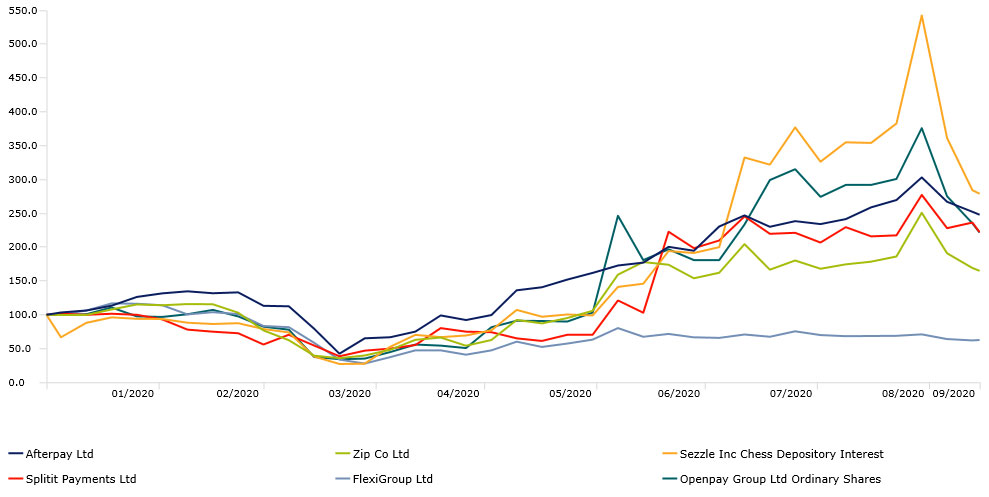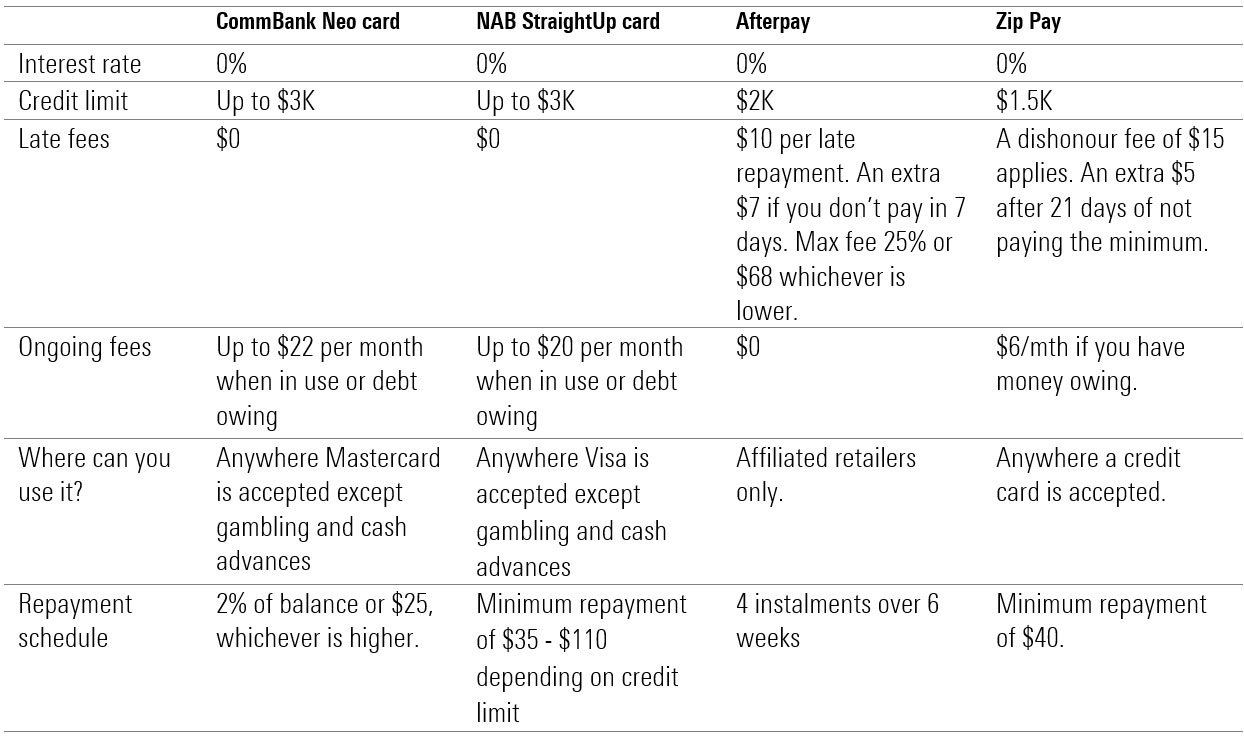No value in Afterpay, says Morningstar-gold manager
Greencape Capital's David Pace believes passive money flowing into the stock creates an opportunity for active managers to shine.
Mentioned: Coles Group Ltd (COL), Greencape Broadcap (14654), Bennelong Australian Equities (16998), Hyperion Australian Growth Companies (3344), First Sentier Australian Share (3404), Ausbil Australian Active Equity (6117), Computershare Ltd (CPU), EML Payments Ltd (EML), IRESS Ltd (IRE), NVIDIA Corp (NVDA), Nextdc Ltd (NXT), PayPal Holdings Inc (PYPL), Qantas Airways Ltd (QAN), QBE Insurance Group Ltd (QBE), Seek Ltd (SEK), Zip Co Ltd (ZIP)
A Morningstar Gold-rated fund manager says Afterpay is too hot to hold because it lacks earnings sustainability and the barriers to entry in the sector are increasingly brittle.
Greencape Capital's David Pace used last week's Fidante Partners Investment Forum to pan Afterpay (ASX: APT), saying that as competition heats up in the buy-now pay-later sector, he struggles to "find value" in the popular stock.
Instead, Pace believes his decision not to invest in the company will deliver for investors if ETF providers are forced to pick up the stock.
"The inclusion or exclusion of any name into or out of an index has little bearing on what our portfolio looks like," he said, referring to APT's brief entry into the ASX largest 20 companies last month after it rallied over 850 per cent off March lows.
"That's what the passive money reacts to. We think fundamentally, and we think bottom-up. We can't find value in APT, and now that it holds a larger index position, we see that as an opportunity to earn alpha by not owning the stock over the medium to long term."
Afterpay's surge to $95 last month brought its market capitalisation to $25 billion, making it more valuable than larger, more established players like Coles (ASX: COL), QBE Insurance (ASX: QBE) and Qantas (ASX: QAN). At the depths of the virus, the stock was trading below $9.
Other asset managers share Pace’s concerns. Eiger Capital's Stephen Wood, for instance, argues covid has accelerated BNPL the business plans forward to unsustainable levels.
"This sector relies heavily on retail to drive its business case forward," says Eiger, the senior portfolio manager of the Australian Small Companies fund.
"Retail has had a phenomenal stimulus hit from government plans and Australians’ super draw down. It seems unlikely to us that some of the key retailers that BNPL helps are going to be able to cycle these numbers next year."
Morningstar's Australian growth managers are almost equally divided about whether Afterpay should feature in their portfolios. Hyperion and Bennelong (which are Silver-rated) and CFS and Ausbil (which are Bronze-rated) all count Afterpay as a major holding in their portfolio declarations to Morningstar. In contrast, Greencape, Platypus and Yarra avoid the name.
Morningstar medallist large-cap Australian equity growth funds with Afterpay in their top-10 published holdings

Source: Morningstar Direct, Stock Intersection
Pace’s concerns about Afterpay do not extend to other tech stocks, however. His colleague, Nikki Thomas of Alphinity Investment Management, also on the panel, was particularly bullish about the outlook for global technology stocks, saying firms were benefiting from an acceleration of trends as consumers turned to technology to get them through lockdowns. Historically low rates also play into the picture, she says.
"Low interest rates are here to stay for considerable time, and of course that means if you can find growing businesses that are delivering strong cash flows, you're relative attractiveness of those businesses is much higher than the world we were in just a couple of years ago," she says.
"Looking for those sorts of businesses—they're often in that technology space because they have low reinvestment requirements, and they have fantastic growth opportunities because of secular tail winds."
Within his own portfolio, Pace has exposure to several Australian tech names including digital gift card company EML Payments (ASX: EML), adviser software provider IRESS Ltd (ASX: IRE) and stock transfer company Computershare (ASX: CPU). The gold-rated Australian equities fund can also hold 10 per cent in offshore equities, allowing Pace to invest in US-based chipmaker NVIDIA (NAS: NVDA) and data centre operator Nextdc Ltd (ASX: NXT). However, he says the numbers just don't stack up for Afterpay.

BNPL services like Afterpay and Zip Pay have attracted more than 5 million customers between them.
Pace argues that Afterpay is a bit too frothy, contrasting it with job classifieds website Seek (ASX: SEK).
"When we have an APT discussion, we're always comparing names," he says.
"A name like SEEK has an exceptional core business that throws off a lot of cash, has stable of what they refer to as early stage ventures. None of them are currently making money, but they're all very good businesses growing at a rate of knots.
"If I put those businesses on the same revenue multiples as APT is on, I could find you $6 or $7 value.
"It's always about benchmarking but from a bottom up perspective, we don't think the barriers are high enough for APT, and we don't think the earnings are sustainable enough."
Competition heats up
There are already signs that BNPL's moment in the sun could be fading. The sector suffered major blows earlier this month, ushering in an abrupt end to its record stock-price run.
First, US-payments giant PayPal (NAS: PYPL) announced its entrance into the BNPL market with its “Pay in 4” interest-free product in time for Christmas. Then, two of Australia's big four banks—NAB and CBA—launched interest-free credit cards within days on each other in a brazen attempt win customers back from the thriving BNPL industry.
The news of increased competition, compounded by Wall Street's volatile technology sell-off, saw prices tumble across the BNPL sector. Afterpay is down 14 per cent to $72.58 this month, Zip Co (ASX: Z1P) shares crashed 27 per cent to $5.84, and US-based Sezzle (ASX: SZL) came out worst, down 33 per cent to $5.83.
Investment growth | ASX BNPL stocks, year to date
Time period: 01/01/2020 - 14/09/2020

Source: Morningstar Direct
“These new cards signal it’s game on between the big banks and buy now, pay later," RateCity.com.au research director Sally Tindall says, noting that BNPL services like Afterpay and Zip Pay (ASX: Z1P) have attracted more than 5 million customers between them.
“Hopefully this competition will bring more low-cost, consumer-focused credit options to the table."
First-mover advantage
Afterpay continues to garner backing from several growth managers, including Hyperion portfolio manager's Mark Arnold and Jason Orthman who sung the stock's praises ahead of reporting season. Hyperion added APT to the fund for the first time in June 2020, describing it has a "innovative business serving the next generation".
"For us it really comes back to that 10-year valuation. What's interesting for us is not what sales or earnings are going to be in August or 12 months' time," Orthman told Morningstar in late July.
Asked if he was worried about the low barriers to entry for BNPL firms, Orthman says he believes in Afterpay's long-term market-leadership. "You need to be the number one or number two player, and that's absolutely what Afterpay is".
Pace's attention has turned to managing risk on the current environment.
"We're not in the business of flipping coins—for us there are too many binomial events on the table today where we have very little clarity," he says.
"What does Australia look like post JobKeeper? How many businesses will go to the wall? Which way goes the US election go? All the trade tensions we're seeing with China.
"We're unashamedly not out on the curve right now.”
How do the new cards compare to BNPL?

Source: RateCity

